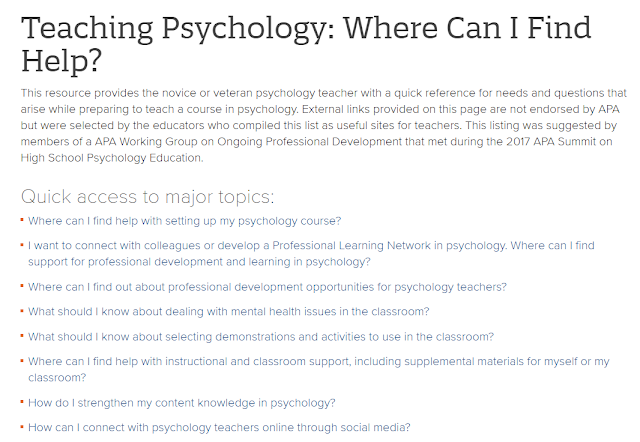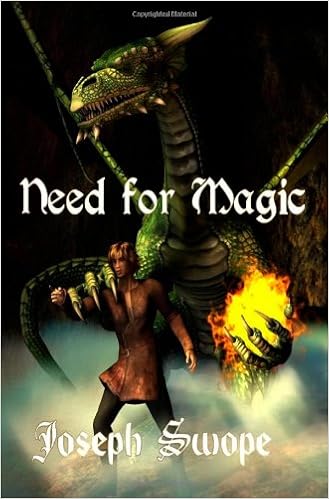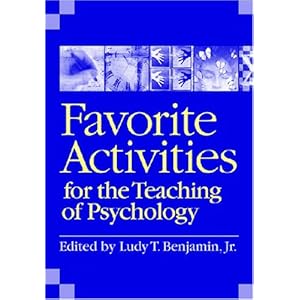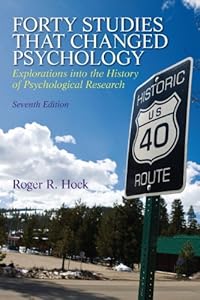Welcome new psychology teacher! Congratulate yourself on finding/stumbling on/being forced to teach the best class in high school! There is an abundance of materials out there so you don't have to reinvent the wheel your first year (although you should feel free to after that). Here are some of the best resources.
The following is a combination post with material from Chuck Schallhorn and Steve Jones.
1) TOPSS stands for Teachers of Psychology in Secondary Schools and is part of the American Psychological Association.
Join TOPSS and you become an affiliate member of the APA at a fraction of the cost that other professionals pay, only $50 per year.
*NEW*
In 2011 teachers on the TOPSS board created a manual for new high school psychology teachers. This was written by high school psychology teachers who have "been there" with few resources and little help among your building colleagues.
Be sure to check this out!
TOPSS has lesson plans for every unit of the high school psych course and is in the process of revising older units so that the lesson plans remain vital and useful. They're created by high school teachers and are edited by psych professors. There's also a quarterly newsletter, the Psychology Teachers Network, and an annual workshop for high school teachers at Clark University. Finally, and maybe most importantly, the APA and TOPSS have created the National Standards for High School Psychology.
The first version of standards was created in 2005 and the newest version of the standards was
released in 2011. Following the Psychology Summit of 2017, a new steering committee has been tasked with creating new and updated standards in the upcoming years.
Full disclosure, Steve is a former chair of TOPSS and Chuck is currently a member-at-large.
2) The College Board
Even if you don't teach AP Psychology this is a great resource -- and if you do, it's terrific! Here are some pages to start with.:
3) Twitter
You will be amazed at all the valuable resources that are at your fingertips via Twitter. Many high school psychology teachers (like myself) consider my colleagues on Twitter to be an extremely valuable part of their personal learning community (PLN), and often share ideas and resources with each other.
In the past couple of years the hashtag #psychat has become a great way to share information as well.
Other teachers are also using Twitter as a way to interact with their students online in many ways, such as commenting on news articles, sharing new sites and even homework reminders.
You can also follow Steve on Twitter at
@highschoolpsych or Chuck at
@MtnHousePsych.
4) Teaching psychology activity books.
These were compiled by Ludy Benjamin et. al. and have a wide variety of activities for intro psych courses.
Some are hits and some are misses (in my opinion) so you might want to buy one and see what you think.
5) Forty Studies that Changed Psychology
An excellent overview that will be invaluable to you if you're just getting started, and is often used by many AP Psych teachers during the year or as a summer assignment.
6) The publisher of your textbook.
Find out what book you'll be using, then contact the publisher and get in touch with the high school representative for psychology. They are usually very helpful and can give you an idea of what might be available for you for free. A great tip from Michael Donner on the AP Psych list is to contact a publisher of another psychology textbook and see if you can get an exam copy of that book (or even find a used copy online). A second book can be very helpful for helping you come up with alternate examples or explanations for your students. Chuck has more than 15 alternate introductory texts--there are even activities one can do with multiple textbooks.
7) The National Council for the Social Studies Psychology Community.
This group is part of NCSS and helps psychology teachers in many ways, including annual presentations at the NCSS conference, newsletters and more. They are available on Twitter at
https://twitter.com/NCSSPC
You can e-mail chair Daria Schaffeld at daria.schaffeld AT d214.org to get a copy of the latest newsletter and to find out more. Also, consider attending the annual
NCSS Conference to hear great presentations.
8) Your fellow teachers!
Though there are still listservs (which I have purposely omitted), there is the facebook AP Psych teacher group. While there are some excellent resources shared, some of the ideas shared are not connected to standards or other reliable sources and lack pedagogical quality. The google drive there is filled with ideas, so if you have time and interest, do check it out.
9) A Blog Plug: this Teaching High School Psychology blog
The blog was created by Steve Jones, Kent Lorek, and Chuck Schallhorn with Chuck being the primary contributor at the moment. Other contributors include Rob McEntarffer, Nancy Diehl, and Kristin Whitlock. It's a site for us to share with our fellow teachers the things that we like, find interesting, have questions about, etc. Follow us via e-mail so you are notified every time we post something new, in your RSS reader or just bookmark us and visit when you can.
When planning a new unit, check out the blog at
http://teachinghighschoolpsychology.blogspot.com/ and do a unit search for videos and assignments that we have. You can do this by checking out the list of units in the left-hand column of the blog.
There are hundreds of ideas and resources we have posted throughout the years. One final bit of advice: Psychology is a science. It doesn't matter what your background is as long as you're willing to embrace the scientific perspective and run with it. Have fun and enjoy teaching psychology!
We have a THSP Psychology folder on Google docs that has many resources for each unit. These activities have been vetted and are appropriate and quality lessons
https://drive.google.com/open?id=0B28t_LsPkwHefnRSTU5aWVFQVHo3MVBSZEEzTHczTXpPT09EMzVOLXhsdVBVRmdNTmRNUms
**test out this link and make sure you can get inside each folder. Contact Chuck if there are any issues with the link.
10) Brain Games
The video series from National Geographic is outstanding for psychology and neuroscience demonstrations. In fact, it has overtaken many of our in-class demos both in terms of quality and quantity. You can purchase the DVDs online at Amazon.com or stream a couple seasons on Netflix. For content guides for all five seasons, click here.
11) Chuck Schallhorn has a YouTube Channel
This can help out with some of the more complex ideas for the students at:
https://www.youtube.com/channel/UCOG05VwbujNwGUX5UA0zcXQ
12) Chuck and Educator.com
https://www.educator.com/psychology/ap-psychology/schallhorn/
It costs money, but if you are desperate, this should help out. You can also search YouTube for teachers who have put their lessons online. They are of varying quality
13) APA Division 2-The Society for the Teaching of Psychology
They have an
amazing set of resources on their OTRP website.
14) Joe Swope (longtime psych teacher who is currently on the TOPSS board) has an amazing site you can sign up for at
http://swopepsych.com/. There are many quality resources here including his videos on psychology.
17) Crash Course Psychology videos
The main playlist is available here--great for quick reviews, overviews, background information, or even as student homework--they are densely packed with information.
If there are any resources we missed, please leave them in the comments.
posted by Chuck Schallhorn in 2018.
posted by Chuck Schallhorn




































